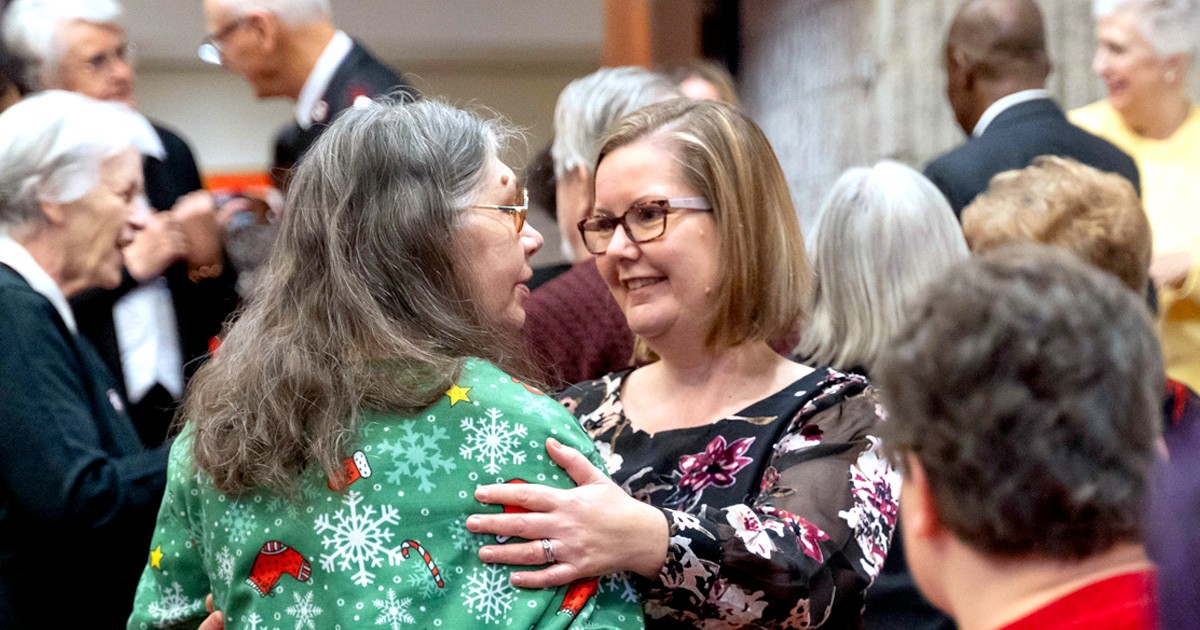 He's been called a leader of the “Christian left,” but Tony Campolo would likely reject such labels. A respected evangelical speaker, author and Baptist minister, Campolo has a long history of being politically active, speaking out on social issues and acting as a spiritual adviser to former president Bill Clinton.
He's been called a leader of the “Christian left,” but Tony Campolo would likely reject such labels. A respected evangelical speaker, author and Baptist minister, Campolo has a long history of being politically active, speaking out on social issues and acting as a spiritual adviser to former president Bill Clinton.
Salvationist's associate editor, Kristin Ostensen, spoke to Campolo about social justice, gay marriage and the most important political issues facing Christians today.
Why do you think it is important for Christians to be active in the political realm?
Because the Bible teaches that Jesus Christ is Lord of all. And in the Book of Ephesians we read that he desires to bring all principalities, powers, dominions and thrones into subjection to himself—specifically, through the church.
What do you think are the most pressing political issues today?
I think the church has tended to overemphasize certain issues to the neglect of others. For instance, I think the most pressing issue that Jesus raises is our treatment of the poor and the oppressed. As it says in Matthew 25, we are called to reach out to those the world defines as the “least of these” and minister to them with love and care. We have tended to focus almost all of our attention as of late on the issue of gay marriage. I am a conservative on gay marriage, but I think that the church's preoccupation with this, to the diminishing of its emphasis on the poor, is a mistake.
The Salvation Army is not as guilty of this as are other denominations, as it has always seen caring for the poor as crucial to the core of the gospel. And I think that has made The Salvation Army a credible faith group. While secularists, agnostics and atheists look at The Salvation Army with respect, they make accusations that the rest of the church has not responded to the poor as it should.
Another issue that I think the church has neglected is that we have ignored the rights of Palestinians in the struggles of the Middle East, and especially the struggles of Palestinian Christians who feel that their Christian brothers and sisters on the other side of the Atlantic don't even know they exist. This absence of concern has ramifications for our witness to the entire Muslim world. We talk about our hope to win Muslims to Christ, but when they see us ignoring the sufferings of Palestinians—and especially Palestinian Christians—they begin to say that we don't really love them. There are 17 million Christians in the Arab world—we seem to forget that. The biblical concept of justice requires that we treat the Palestinian Muslims with respect and love, and call for justice on their behalf.
As you note, one political issue that is receiving a lot of attention in the United States right now is same-sex marriage. In Canada, same-sex marriage has been legal in all provinces since 2005, but there is still debate over the church's position on homosexuality. What is your position?
I believe that the government should give equal rights to gay and heterosexual couples. You cannot say to people, “I love you, but you can't have the same rights I enjoy.” I think the issue in Canada, as it is in the United States, is over whether or not to call gay erotic relationships “marriages.” The word “marriage” is the real problem. I believe that marriage is a sacred institution. The government should not be determining who can and cannot enter in a sacred relationship; it's the church that should define what sacred relationships are. Therefore, marriage belongs in the church and the government has the responsibility of affirming the legal rights of couples.
You cannot say to people, “I love you, but you can't have the same rights I enjoy.”
Having said that, you mentioned earlier that you take a “conservative” approach to the issue.
Yes. Personally, I have a difficult time at trying to harmonize gay marriage with my understanding of the teachings of Scripture. But as a Baptist, I believe in soul liberty. In other words, I believe that my interpretation of Scripture is my interpretation of Scripture and should not be taken as authoritative.
I understand that your wife, Peggy, disagrees with you on this—she supports monogamous, same-sex relationships and believes they should be recognized by the church. How do you approach this difference of opinion?
We manage it in two ways. First, we keep the conversation going. Second—and this is important for all discussions that we have, not only with each other in our marriage but with each other in the church—we say, “This is where I stand but I could be wrong.” If both parties in such a debate do not acknowledge that they could be wrong, they'll gain nothing from the conversation. Each will be trying to impose his or her views on the other and there will be no listening or learning. There's only one thing I'm sure of, as Paul writes, this one thing I know: Christ and him crucified. I'm willing to enter into discussion on almost everything else.
Though homosexuality is a “hot topic” among Christians, you have mentioned on numerous occasions that you believe this to be a “secondary” theological issue for the church.
It certainly is in the Bible, isn't it? When Jesus never speaks to the issue directly, you would have to say this was not on his “hit list” of sins. Judgmental religious people, on the other hand, were right up there at the top of what he condemns. There are thousands of verses of Scripture that call upon Christians to be concerned about the poor and oppressed. If one takes the weight of Scripture—namely, how much more space is given to caring for the poor than is given to the issue of gay marriage—one would have to say that the weight is not on gay marriage.
What would you say are some primary theological issues for the church at this time?
I think that the church needs to speak more strongly against violence. Gandhi once said that everybody knows what Jesus said about violence except for Christians. There's truth to that, isn't there? Because as I travel around the Christian community—especially in evangelical circles in the United States—many Christians have no problem with the doctrine of capital punishment, even though Jesus said, “Blessed are the merciful.” And on the issue of war, I think the Bible is clear in the New Testament. Moses taught “an eye for an eye and a tooth for a tooth.” But Jesus, in the Sermon on the Mount, makes it clear that there's a higher morality than the morality taught by Moses. Jesus says, “I give you a new commandment,” and that means that we overcome evil with good. When Jesus said, “Love your enemies,” I don't think it's stretching the point to say he probably meant we shouldn't kill them.
When the church becomes a political power, then it has ceased to be what God wants it to be.
You're one of the founders of the Red Letter Christians movement (redletterchristians.org). What is this movement all about?
I spend a great deal of time on university campuses speaking to students and the comment that I hear over and over again is a simple one: “We think that Jesus is wonderful, but we don't think the church is wonderful. And if the church lived out what Jesus taught, we would have to give the church serious consideration.” They look at the church, which spends most of its money on itself, and they're saying, this does not adhere to a Jesus who said, “If you want to be my disciple, sell everything that you have, give it to the poor, take up the cross and follow me.” In winning the university students that I meet into a loving relationship with Jesus, I figure that the place to start is with Jesus.
The evangelical community has paid great attention to the teachings of the Apostle Paul, and this is important because, interestingly, you cannot find the doctrine of justification by faith in the Gospels. Those of us who believe that we are saved by grace through faith have to go to Paul to support our beliefs. On the other hand, if you want to learn about the kingdom that God wants to establish here on earth and the lifestyle that is prescribed for those who want to become citizens of that kingdom, you have to go to the Gospels.
The goal of the Red Letter Christians movement is to establish balance between justification by faith and the lifestyle of Jesus. Both are essential if we are to be Christians. We have to have orthodoxy—right beliefs. We also have to have orthopraxis—right practice. It's not enough to just believe the right things. We must be committed to doing the right things, as Jesus prescribed.
How do you think Salvationists and other Christians can promote social justice in the political realm?
I think that the way in which you promote social justice is to take the Bible seriously. If we take the teachings of Jesus at face value, we will respond to the needs of the poor in every way we possibly can. We will also respond to issues like capital punishment and war. We'll stand up against those forces that oppress women and diminish their dignity. And even if we do not support gay marriage, we will stand up against the dehumanization of gay, lesbian, transgendered and bisexual people. We will not allow the world to diminish them as human beings and make them into what I have heard some people call “abominations.” Those who say that they are abominations fail to face the fact that each of them is so precious that if any one of them had been the only person that ever lived, Jesus would have come into the world and given his life just for that person, so great is his love for each of them.
How can Christians be politically active without forcing their views on others?
We must speak truth to power, but we ourselves should never use power to impose our views on others. When the church becomes a political power, then it has ceased to be what God wants it to be. God is neither a member of the Conservative Party nor the Liberal Party; he's neither a Democrat nor a Republican. He stands above all political parties and he calls his followers to speak to all parties the justice values of Scripture.










Leave a Comment